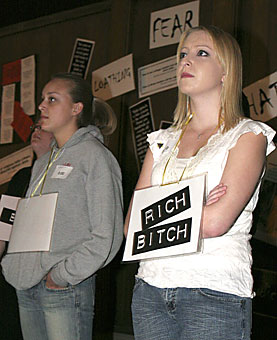 |
|
MATT ROBLES/Arizona Daily Wildcat
|
Theatre arts sophomore Christopher Burnham, right, and journalism junior Sam Brace act as Nazis shouting obscenities at a student participating during the Tunnel of Oppression last night at Kaibab-Huachuca Residence Hall. The guided tour allows students to experience how it feels to be a victim of discrimination.
|
|
|
By Cassie Tomlin
Arizona Daily Wildcat
Wednesday, February 16, 2005
Print this
Students got a taste of what it feels like to be victims of hate and discrimination yesterday on the opening night of the UA's 17th annual Tunnel of Oppression.
The walking, multi-media tour guided students through the basement of the Kaibab-Huachuca Residence Hall, 922 E. Fourth St., and through rooms featuring themed skits demonstrating discrimination relating to class, race, physical challenges, relationship violence and body image.
"This is a campus of mostly white, middle-upper class students," said assistant director of multicultural education and advocacy for Residence Life and project adviser Brian Shimamoto. "We hope the tunnel helps them to realize that not everyone experiences the way you do."
Last year's Tunnel of Oppression was held in the Student Union Memorial Center because construction on the Park Student Union next door to Kaibab-Huachuca forced coordinators to find another location.
 |
|
MATT ROBLES/Arizona Daily Wildcat
|
Pre-architecture freshman Maggie Kane, left, and pre-nursing freshman Samantha Marscovetra watch a video presentation on discrimination during the interactive Tunnel of Oppression at Kaibab-Huachuca Residence Hall last night.
|
|
|
Shimamoto said based on evaluations taken after the tour, students thought the small space of the residence hall's basement was more effective than the large ballroom of the Student Union Memorial Center.
Theatre arts sophomore Jen Whitcomb ran the body image skit because she said the issue is something she has always struggled with.
Whitcomb picked two people out of every group and instructed others in the group to read slips of paper with negative comments regarding body types.
"I was teased growing up a lot and it took me a long time to come to terms with it," Whitcomb said. "Sometimes you have to shock people to wake them up."
Theatre arts sophomore Christopher Burnham volunteered in the tunnel as a Nazi and screamed at the group of people, herding them into a room with information about human genocides.
Burnham said his role was difficult because he had trouble coming up with sufficient derogatory and vulgar things to yell at the students.
Burnham said the Tunnel of Oppression is important to the UA campus because many students don't realize how it feels to be attacked because of their race or sexual orientation.
"I identify as a bisexual, and I face insults and indignation," Burnham said. "I want people to have insight into what it might be like to be part of a group that gets treated this way."
Leo Federico, a political science freshman, said he volunteered to act in a learning disabilities skit in hopes of making people aware of derogatory remarks that hurt people.
"We all say things like 'stupid' and 'retarded' without realizing that we're hurting someone," Federico said. "People need to know that hatred and discrimination exist and that we need to get rid of it. There's no room for it at the UA or anywhere."
Johnathan Turner, an undeclared freshman, said he thought the Tunnel of Oppression was not shocking or surprising, but it was realistic.
"It was very effective," said Turner. "It opens your eyes a little."
Turner attended the tour with his INDV class.
He said, although he could not relate with any of the discrimination displayed in the tour, it helped him to understand how such cruelty might feel.
Student coordinator Alison Reese said this year, planners tried to make the tunnel more interactive in hopes of making a bigger impact. This is Reese's third year planning the Tunnel of Oppression.
Reese said she has spoken with fellow students who don't know she's involved in the Tunnel of Oppression who say they have benefited from the experience.
"They say they've gone through and gotten a different perspective on things," she said. "That makes me happy."
